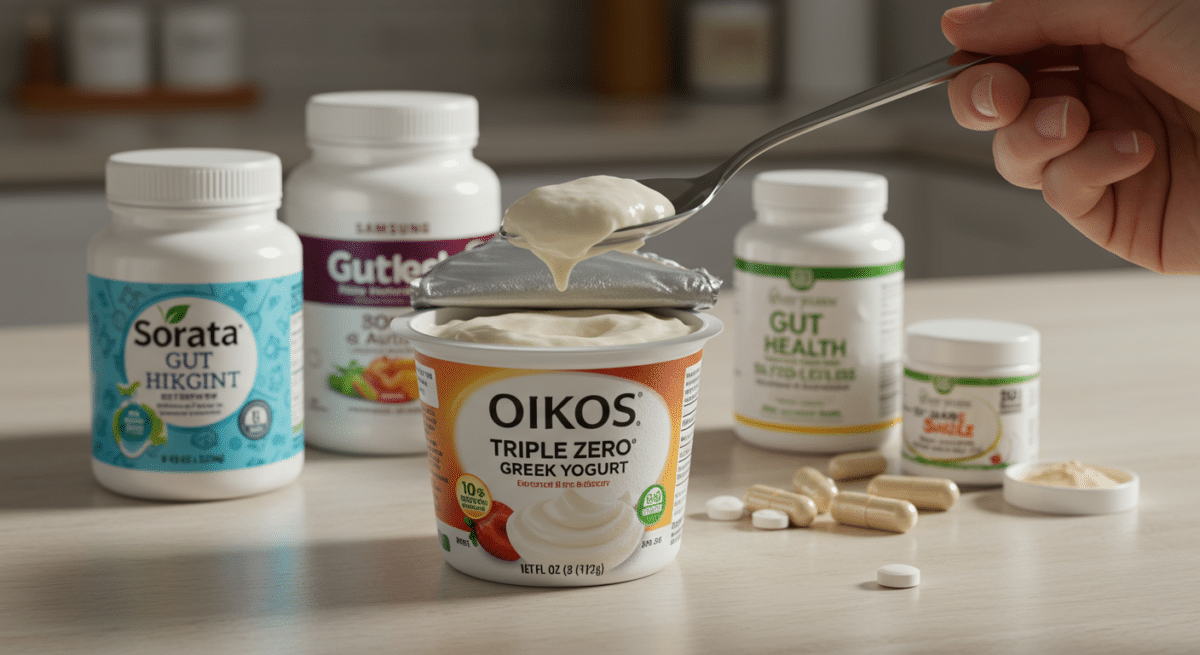Ever heard the phrase “trust your gut”? That wisdom goes deeper than instincts—it’s about real science. A few years ago, I struggled with bloating, fatigue, and digestive discomfort after nearly every meal. That’s when I stumbled into the world of probiotics, not through supplements, but a spoonful of creamy Oikos Greek Yogurt.
It wasn’t an overnight fix, but after a few consistent weeks, I felt lighter, more regular, and less bloated. It sparked my curiosity, leading to research that revealed how essential probiotics are to overall wellness—and how powerful real food like Greek yogurt can be when it comes to restoring balance to the gut.
In this article, we’ll explore:
- What probiotics actually are
- How Greek yogurt supports your microbiome
- Why Oikos might be your best probiotic food ally
- How much to eat and when
- Answers to common gut health questions
Don’t miss our deep dive on Health Benefits of Greek Yogurt to complement this piece with even more science-backed benefits.
Table of contents
PART 1: What Are Probiotics and Why They Matter
What Are Probiotics? (Scientific Overview)
Probiotics are live microorganisms—mostly bacteria and yeasts—that, when consumed in adequate amounts, offer health benefits, especially in the digestive tract. They naturally exist in our gut and work by:
- Maintaining a healthy balance of gut flora
- Reducing harmful bacteria
- Enhancing nutrient absorption
- Supporting immune function
Probiotics are most commonly found in fermented foods like Greek yogurt, kefir, sauerkraut, and kombucha. Among these, yogurt is the most widely consumed and accessible source.
These friendly bacteria can restore balance after disruptions caused by stress, illness, or antibiotics.
How Gut Microbiota Impacts Health
Your gut microbiome is made up of trillions of bacteria—some good, some bad. A well-balanced gut supports:
- Digestion and nutrient breakdown
- Mental health through the gut-brain axis
- Immune system efficiency
- Skin health and inflammation control
When the gut flora is off-balance (a condition called dysbiosis), you may experience issues like:
- Bloating and irregular bowel movements
- Food intolerances
- Fatigue and mood swings
- Weakened immune response
This is where probiotic-rich foods like Oikos Greek Yogurt step in—to reintroduce beneficial strains and support digestive health at its core.
PART 2: The Science Behind Greek Yogurt and Live Cultures
Fermentation and Probiotic Strains in Yogurt

To understand how Greek yogurt benefits gut health, it helps to start with fermentation. Yogurt is created through the fermentation of milk by live bacterial cultures, most commonly:
- Lactobacillus bulgaricus
- Streptococcus thermophilus
These strains convert lactose into lactic acid, which thickens the milk and gives yogurt its tangy flavor. But more importantly, they create an environment where probiotics can thrive. When you eat yogurt containing live and active cultures, you’re essentially introducing billions of beneficial microbes into your gut.
Some brands even add additional strains like Lactobacillus acidophilus or Bifidobacterium lactis, both known for supporting digestive balance and gut flora diversity.
This bacterial activity is what makes yogurt a functional food—something that does more than just provide calories and nutrients. It actively promotes health.
Differences Between Regular Yogurt and Greek Yogurt
While both forms offer health benefits, Greek yogurt stands out due to its nutrient concentration and probiotic density:
| Category | Regular Yogurt | Greek Yogurt |
|---|---|---|
| Protein | 5g | 15–20g |
| Sugar | Higher | Lower |
| Texture | Thin | Thick/creamy |
| Lactose Content | Moderate | Lower |
| Probiotic Density | Moderate | High (in some) |
Because of its straining process, Greek yogurt contains more protein and less lactose, making it a better option for individuals with mild lactose sensitivity.
Plus, the thicker consistency of Oikos Greek Yogurt makes it ideal for cooking, snacking, and supporting a high-protein diet—all while delivering essential probiotic cultures that aid digestion.
Discover great ideas like Homemade Greek Yogurt vs Store-Bought to understand how strain quality affects your gut.
PART 3: Oikos Greek Yogurt and Digestive Wellness
What Makes Oikos Different from Other Greek Yogurts

There are many brands out there, but Oikos Greek Yogurt has carved out its niche by focusing on nutrition, live cultures, and clean ingredients.
Oikos Triple Zero, for example, offers:
- Zero added sugar
- Zero artificial sweeteners
- 15g of protein per serving
- Live and active cultures for gut support
Unlike some flavored yogurts that contain excess sugar, Oikos maintains probiotic activity without compromising on health. That’s critical when you’re trying to improve digestive function or maintain regularity.
In fact, choosing a yogurt with minimal additives ensures the live cultures remain effective, helping you get the most out of every spoonful.
Looking for inspiration? Try this Greek Yogurt Parfait Honey & Nuts, a gut-friendly snack that balances prebiotic fiber (from nuts) and probiotics from yogurt.
How Oikos Supports Gut Health and Immunity
A strong digestive system doesn’t just mean fewer tummy issues—it means better absorption of nutrients, a stronger immune system, and even improved mood.
Oikos Greek Yogurt helps by:
- Replenishing beneficial gut bacteria with every serving
- Supporting immune response via the gut-immune connection
- Reducing symptoms of IBS like gas, bloating, and constipation
- Enhancing digestion of lactose thanks to bacterial enzymes
Eating Oikos regularly may help restore balance after taking antibiotics or going through periods of high stress—both of which disturb gut flora.
Plus, when paired with prebiotic-rich foods like oats, garlic, and bananas, Oikos can amplify your microbiome’s diversity, making your gut more resilient.
Check out our Health Benefits Greek Yogurt article for deeper insights into how yogurt fits into a daily wellness routine.
PART 4: How Much Greek Yogurt Is Ideal for Gut Health?
Serving Sizes and Daily Recommendations

You’ve probably wondered: “How much Greek yogurt should I eat for gut health?” The good news is, you don’t need to overdo it to get the benefits. According to most nutritionists and gut health specialists, one serving (about ¾ to 1 cup) of probiotic-rich Greek yogurt daily is sufficient to:
- Restore and maintain a healthy balance of gut bacteria
- Improve digestion and nutrient absorption
- Reduce constipation and bloating
- Support overall immune health
For Oikos Greek Yogurt, that translates to one standard 5.3 oz container per day. It’s portable, pre-portioned, and packed with live cultures that help fortify your digestive system.
If you’re just getting started with probiotics or dealing with chronic digestive issues, you might consider splitting the serving—half in the morning and half at night—to introduce the bacteria gradually.
Best Time to Eat Greek Yogurt for Digestive Benefits
Timing matters when it comes to maximizing the probiotic power of Greek yogurt:
- Morning (empty stomach): Probiotics can reach the intestines more efficiently without competition from other food.
- Post-antibiotic use: Helps repopulate your gut with healthy bacteria.
- As a snack between meals: Balances blood sugar while improving digestive activity.
Pair your yogurt with fiber-rich foods like oats, berries, or chia seeds to further improve gut motility and provide prebiotic fuel for your probiotics to thrive.
Looking for a gut-boosting meal? Try our Egg Cupcakes with Yogurt – Healthy Breakfast to sneak yogurt into your morning.
PART 5: Frequently Asked Questions (FAQs)
Yes—when eaten regularly, Greek yogurt with live cultures can help heal and restore the gut lining by replenishing beneficial bacteria, improving digestion, and reducing inflammation. It’s particularly helpful after taking antibiotics or during digestive flare-ups.
Greek yogurt improves bowel regularity, reduces bloating, and promotes smoother digestion. Its probiotics help regulate intestinal movement and break down lactose, which can reduce discomfort and gas—especially in those with mild lactose intolerance.
In many cases, yes. A single serving of Oikos Greek Yogurt can provide billions of active cultures—comparable to some probiotic supplements. Plus, you’re getting protein, calcium, and other nutrients alongside the probiotics, making it a more holistic digestive aid.
Generally, one serving per day (about 5–6 oz) is enough to support gut health. However, individuals with more severe digestive issues may benefit from 1½ to 2 servings spaced throughout the day.
Conclusion
Oikos Greek Yogurt isn’t just a creamy snack—it’s a probiotic-rich powerhouse that can transform your gut health. With its live cultures, high protein content, and digestive support benefits, Oikos stands out as a daily food that nourishes from the inside out.
If you’re serious about healing your gut, supporting immunity, and improving digestion naturally, a spoonful a day really does go a long way.
Don’t miss our full recipe guide on Oikos Greek Yogurt Recipes to enjoy the health benefits in delicious, everyday meals.

2 thoughts on “Understanding Probiotics: The Role of Greek Yogurt in Gut Health”